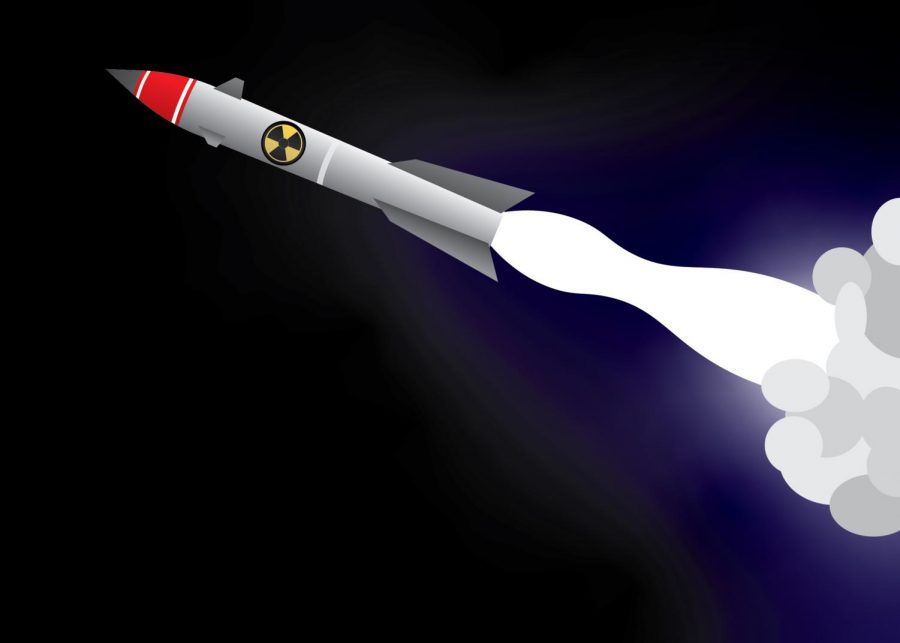Nuclear Weapons and Their Effects
June 8, 2021
Nuclear weapons have been involved in destructive and devastating events that have been easily avoidable in the numerous occasions they have been used. These said weapons carry out mass destruction, toxic methane, and cancerous, deadly radiation that can kill somebody even 20 years post-detonation.
Through the years of discussing this weapon, people are still asked whether or not nuclear warheads should be used in society today, such as last-ditch attacks, or for the use of it during war or battle. The astounding answer should be no. The negatives of this killing machine outweighs the positives by nearly 100 to one.
Nuclear weapons have only been used two times during war. These two incidents are fairly obvious to the average individual. The first one, as well as the second were initiated by the United States against Japan near the end of World War II. The bombs named “Little boy” and “fat man” detonated over the two towns of Hiroshima and Nagasaki, killing over 200,000 people, and possibly even more due to radiation years after the bombs were set.
Thankfully, no other nation has decided to initiate force by nuclear weapons in a war time manner. Although over 2000 detonations of nuclear weapons have been detonated for testing purposes. Only a few countries, such as North Korea, are suspected of seeking them.
There are two basic types of nuclear weapons: The first is those that derive the majority of their energy from nuclear fission reactions alone, and the others are those that decide to use fission reactions to then begin nuclear fusion reactions that can produce an excess amount of total energy output from the weapon itself.
The most important thing out of all ideals when it comes to the use of nuclear weapons is its effects on the environment. Nuclear warfare includes plutonium, uranium, benzene, PCBs, strontium, cesium, mercury and cyanide. All of these described ingredients have detrimental impacts on the environment, often finding their ways into habitual areas, such as oceans, rivers, and soil. This will harm local wildlife due to governmental use of nuclear weapons, even during the testing phase.
The primary issue with these said weapons being dangerous to wildlife and our planet is the radiation that it emits through its “mushroom cloud” post-detonation. With the world already at a dangerously problematic state when it comes to our environmental issues, detonating nuclear weapons on the earth’s soil will not improve its conditions whatsoever.
Nuclear weapons can help contribute to climate change, kill off entire species, and destroy the entire world if a nation is capable of taking control of enough weaponry. As a result, massive suffering will be the finished product of a detonated bomb.
When asked how freshman Aric Gyekis would deal with a confrontation with a nuclear industrial complex in order to continue/halt their use of nuclear weapons, he stated “I would just tell them the damage it caused, or causes. and how dangerous it can be when just sitting in their laboratory, with a possibility of it exploding at any moment, which will kill them all.”
Though it was a fairly dark response, it can be agreeable to the average individual. The world’s most powerful officials have to be obligated to understand that nuclear weapons have absolutely zero positive influences for other nations, as well as their own personally governed nation, or even society and the environment as well.
When asked who was at fault for the inflation, as well as the creation of the use of nuclear weapons, senior Marc Galvagno described, “It was probably the people who invented them. Even though I have no idea who did that, if they were never invented, the things that happened in Japan and other places would’ve never happened, and a lot of people could’ve had their lives saved.”
This brings up a question to ponder, what would life be like if nuclear weapons were never invented? Could life be simpler due to governing nations not wanting to threaten or blow each other up every opportunity they hope to acquire? Or will someone try to create something so powerful that it cannot be stopped, due to nothing being close to it in the first place? This truly is a question to chew over, and if the scenario is true, I myself believe that the earth alongside its governing nations will be a lot more at ease, thus providing society with a safer environment and a world that would hopefully still be ahead of its environmental curve.
Out of all of the individuals interviewed, none of them believe that nuclear weapons should ever be used. All of them believe that they are dangerous to the world, and have no positive influence in any sort of way. All interviewees had similar answers when it came to them being killing devices rather than peacemakers, and none believed that there was a good use of a nuclear device in world history.
These problematic nuclear weapons have provided the world with fear, animosity, and hostility between nations abroad. With environmental issues skyrocketing, the use of these atomic bombs will just make it worse and continue to push planet earth closer to another mass extinction. Nuclear weapons are an awful invention, and should never be used in a wartime manner. It’s negative impacts overshadow its wrongdoings and will wreak havoc on the entire world, let alone the nation it was set on, for years postpartum.



